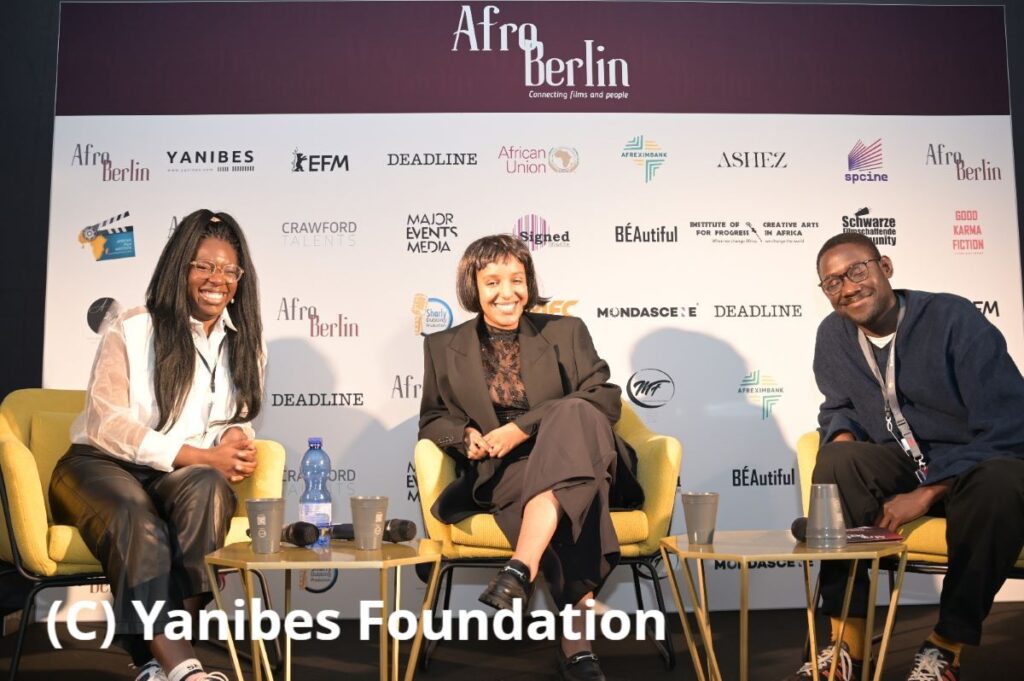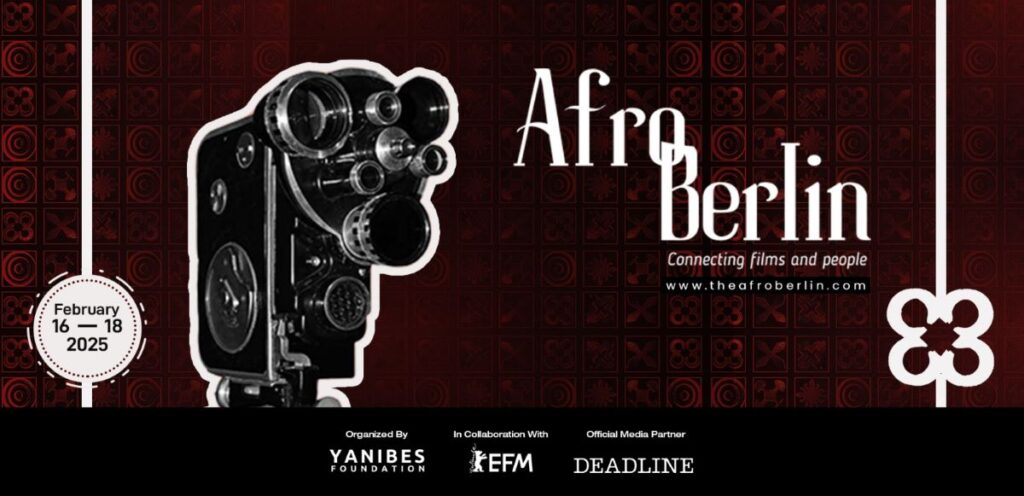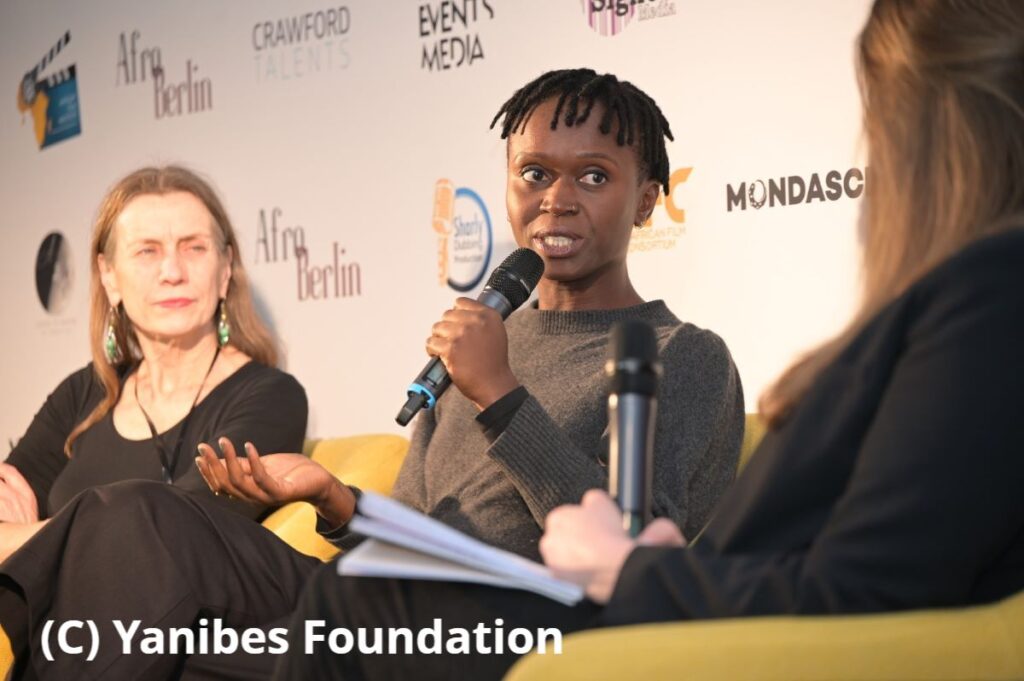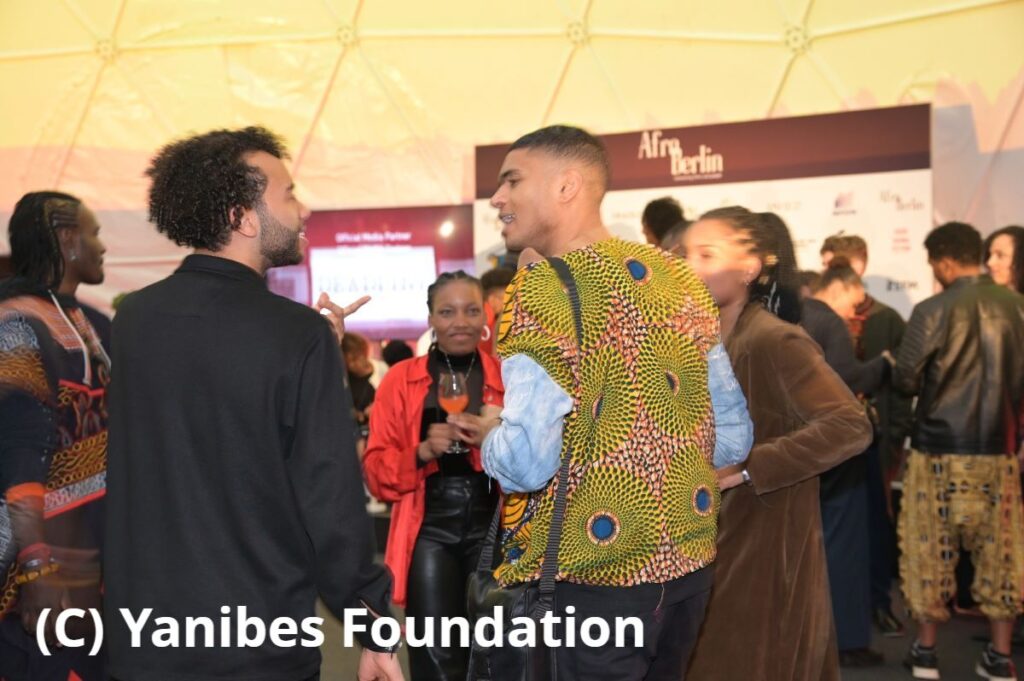In 2024, when Prudence Kolong founded AfroBerlin at the European Film Market (EFM), she had a clear vision: create a space where filmmakers from Africa and its diaspora could connect with the global film industry. Now heading into its second edition in February 2025, the three-day event has established itself as the official African and African diaspora program at one of the world’s most influential film markets.

Operating between Stockholm and Paris, Kolong’s cross-cultural perspective influences her approach to building these platforms. “I’m an Afropean,” she explains during an extended, relatively casual transcontinental conversation with Akoroko in January: “A blend of Caribbean and African heritage. And I’ve lived in so many countries that it shapes how I see things, creates multiple perspectives.”
Her relationship with cinema reflects this breadth: “Film is universal,” Kolong says—a perspective rooted in experience rather than abstraction. It’s part of a lifelong self-directed film education that has shaped her cultural philosophy. “I’ve been studying film on my own since I was a kid,” she notes, her interests spanning from Marvel comic book adaptations to Golden Age Hollywood to contemporary African series, and more. “I love Hong Kong cinema, Japanese film, Indian film. I also watch Bollywood movies and Nollywood movies.”
This multiplicity of viewpoints strengthens her work.
Origins and Evolution
The path to AfroBerlin took shape in 2018 when Kolong created the African Pavilion at Cannes Film Festival, which became the festival’s third most-visited pavilion after the American and British pavilions. Building on this momentum, she launched AfroCannes in 2020, initially called “The Wandering Diasporan.”
From its modest beginnings, the event grew to occupy space at the Hotel Barrière Le Gray d’Albion, earning visibility with digital billboards at prime Cannes locations—for example, one in front of the Grand Hotel, a key gathering spot along the Croisette, and another atop the Splendid, where private meetings and industry deal-making often take place.
“AfroCannes was, and remains, a platform dedicated to amplifying voices that aren’t typically visible at Cannes,” Kolong explains. Support from African-American, Nigerian, and Black British film communities helped attract industry leaders, establishing a model of community-driven growth. This approach carried into AfroBerlin’s February 2024 debut at the Berlinale EFM Conference Lounge, where institutional partners including the African Union and Afreximbank joined forces with creative partners like Crawford Talents and Good Karma Fiction International.

The inaugural AfroBerlin program brought focused discussions on “Nollywood’s New Ambitions” and “The AfroPean Identity in Films,” drawing executives from the Berlinale and speakers from over 20 countries.
Media attention, including coverage in Variety and global outlets beyond Deadline’s official partnership, helped validate the concept. Yet Kolong maintained perspective: “I prefer to wait and see the results. Before an event happens, I can’t make grand claims about what it will achieve,” she said when I asked her about measuring the success of the inaugural event and her assessments of the upcoming second iteration at the 75th Berlinale.
2025 Programming Focus and Partnerships
For 2025, AfroBerlin expands from one to three days at Freiheiter Berlin. “While the first two days follow our established format, we’ve dedicated the third day to exploring how film and music intersect, and how creators can monetize work across both mediums,” Kolong explains. This third day—Afro Film Music Day—brings together executives from Deezer, SACEM, and Sony Publishing Nigeria to explore these opportunities.
The programming reflects current industry preoccupations via multiple lenses. “We made AI a priority because it’s not just a Western conversation—there’s significant AI development happening across Africa. Our industry needs to understand its impact,” Kolong notes.
Three dedicated sessions examine these impacts, with entertainment lawyer Chris Perez of Donaldson Callif Perez and Nigerian-American filmmaker Zubi Mohammed exploring rights issues and creative applications. A partnership with Green Shooting magazine speaks to how traditionally resource-efficient methods in the African context might inform global sustainable practices.
Film financing receives particular attention over several formats. Representatives from La Francophonie present their work with various African countries to build funding institutions, while sessions on international co-production address the complexities of working across different legal and policy environments. A special focus from Konrad Wolf Film University examines pay equity between European and African production crews.

The event balances industry veterans with emerging voices. Effie T. Brown, producer of “Dear White People,” shares insights alongside Swedish actor Alexander Karim, fresh from “Gladiator II.”
French actress Aissatou Diallo Sagna exemplifies the event’s focus on unexpected paths to success. “Her story shows what’s possible,” Kolong says. “She went from working as a nurse in Paris to winning a César Award in just two years, starting with what was supposed to be a small extra role. As a mother of three who had never acted before, her journey resonates with people who might think it’s too late to enter the industry.”
Three themed panels honor pioneering figures: Oscar Micheaux’s session explores independent filmmaking’s challenges, Med Hondo’s examines the diversity of diaspora cinema, and the Hattie McDaniel panel focuses on empowerment, featuring African and African-descended women discussing their roles in advancing the industry.
The programming structure alternates between 40-minute roundtable discussions with industry leaders, focused 25-minute insight sessions for emerging trends, and expert panels exploring technical innovations. Each day builds toward evening networking events, including an afterparty designed to encourage connections between speakers and attendees.
Institutional support has grown to match this expanded scope. Beyond the African Union and Afreximbank’s continued involvement, new partnerships include film commissions and funding bodies from across Africa and Europe. “People come to AfroBerlin specifically to find producing partners, whether they’re from Africa or elsewhere. It’s about making those crucial connections,” Kolong explains.
This broadened base allows for more extensive examination of international co-production opportunities, with representatives from countries as diverse as Brazil, Saudi Arabia, and Kenya sharing perspectives on cross-border collaboration.
Foundation and Vision

AfroBerlin operates under camera-shy Kolong’s Paris-registered Yanibes Foundation, where she splits her time between Sweden and France. Intentionally staying behind the scenes, encouraging the professionals she platforms to become the event’s public face, her commitment to keeping program free is an enduring challenge. “Securing sponsorship remains our biggest hurdle,” Kolong acknowledges. “Our rates are intentionally modest because we’re not looking to profit. We just need to make these events happen. What’s puzzling is the reluctance of brands to engage, even at these accessible levels.”
This funding model, while demanding, aligns with her vision of creating truly inclusive industry spaces. It’s a mission Kolong has pursued through other initiatives. For example, during COVID-19, Yanibes launched a mentorship program, creating an accessible platform that connected industry professionals with emerging talent while supporting local African charities.
Looking ahead, Kolong envisions expanding on each existing Yanibes initiative, and possibly creating new ones, while maintaining their collective core mission of inclusivity and accessibility—both fundamental to the organization. Since the inaugural AfroBerlin edition, the event has, unusually for a major market gathering, required no accreditation for attendance—a policy that continues in 2025.
Kolong’s cinephile’s eye and industry experience combine to create platforms that value both artistic excellence and cultural authenticity. In an increasingly connected film world, AfroBerlin provides a needed space where stories that might otherwise struggle to find their audience in a crowded and highly competitive marketplace can forge the relationships needed to reach screens worldwide.
As Kolong puts it: “The objective is to get to a greater understanding of film as a universal language.”
AfroBerlin 2025 runs February 16–18 at Freiheiter Berlin during the European Film Market. Registration is free and open at www.theafroberlin.com. For more information about programs, partnerships, or participation, contact the Yanibes Foundation team.